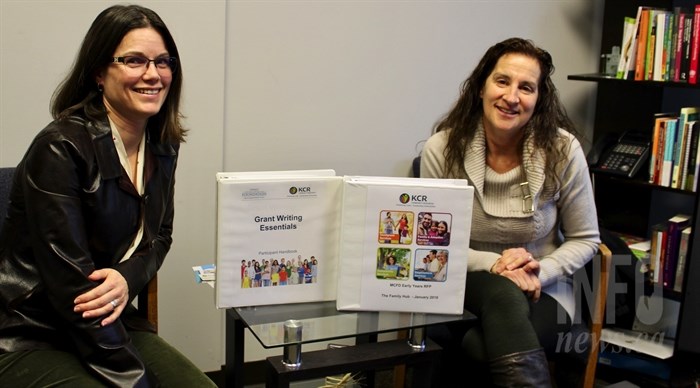
Kelowna Community Resources project coordinator Stephanie Moore (left) and executive director Ellen Boelcke pose for a photo, Thursday, Jan. 24, 2019.
(ROB MUNRO / iNFOnews.ca)
January 25, 2019 - 3:00 PM
KELOWNA - The very survival of hundreds of non-profit organizations in the Okanagan depends on having at least one member skilled at writing grant applications.
Whether it’s a small arts group, an organization helping the hungry or a larger umbrella society such as Kelowna Community Resources, a huge amount of their funding comes from grants that have to be applied for over and over again.
It’s a difficult and time consuming process that is usually done in addition to a staff member’s regular job or a board member’s volunteer time.
“It isn’t something that is paid as part of your job, which makes it really hard for agencies that are smaller and can’t recover that cost,” Ellen Boelcke, executive director of Kelowna Community Resources said. “You’re not doing other things. Or you’re working evenings and weekends.”
For her and her staff, that means spending many hours writing grant applications – many of which run at least 15 pages but some of which fill large binders – in addition to doing their regular jobs. And it’s all at the risk of not actually getting the money.
“All of this is unrecoverable time,” Boelcke said. “So if the government says you write a proposal, you write a proposal. There could be 30 other proposals that they’re dealing with and only one is funded. But 29 other individuals put in a similar amount of time that KCR would have put in. Even if you get the contract, you can’t be back-paid for the time you put into the proposal writing.”
As a somewhat extreme example, she just completed an application for $172,000 to the provincial government that she coordinated with a number of other local agencies and the school district.
It took Boelcke a full two weeks just to write the application in addition to the many hours put in coordinating with the other agencies – all with no guarantee of getting any money. All grant applications received by the funding agency will be carefully monitored.
“When you look at those grants, we’re constantly reminded we’re a not-for-profit society so the grants, in and of themselves, don’t allow us to put ‘profit margins’ in there so it’s really tight,” Boelcke said. “It will run that program and only that program.”
Usually there is a 10 per cent administration buffer but for office and computer equipment that often can only be funded out of fee-for service programs.
Kelowna Community Resources has a $3 million annual budget that requires about 30 grant applications each year. While 71 per cent of the funding comes from the federal and provincial governments, that still requires grant applications for specific programs. There is no core funding.
As part of its mission, the organization works with dozens of other not-for-profits and puts on a volunteer fair each fall. It has also recently started offering grant writing workshops that are made up of six, three-hour sessions. The next one starts on Feb. 6.
That may seem a little counter-intuitive as many of the 700 not-for-profit groups in the Central Okanagan are competing against each other for scant resources.
In fact, Kelowna Community Resources has a non-compete policy so if they know of another local agency already receiving a grant, they will write a letter of support instead of making their own application.
Boelcke would love to get funding agencies to provide multi-year or core funding but that seems more a distant dream.
That means, for an annual program, grant writing starts about five months before the next program is scheduled to start. For smaller organizations, that may mean having to lay off staff between contracts.
While most not-for-profits have to do their grant writing off the sides of their desks, there are a few larger ones that have full-time grant writers. Those are usually groups that do fundraising that they can put towards such costs as opposed to those organizations that are totally reliant on grants.
And the job isn’t becoming any easier. While government funding levels have been stable, they’ve not increased to meet growing needs and money donated to funding organizations is declining.
“There are some trends around that (decreased donations) with things like crowd funding,” Stephanie Moore, project coordinator for Kelowna Community Resources said. “People are jumping on board to fund things that may not have any reporting duties at all, whereas non-profits are required to report where these funds are going.”
Young people also seem to be more focused on international causes than local issues, she said. But there are also encouraging efforts by young people who take it upon themselves to raise money for local causes.
To contact a reporter for this story, email Rob Munro or call 250-808-0143 or email the editor. You can also submit photos, videos or news tips to the newsroom and be entered to win a monthly prize draw.
We welcome your comments and opinions on our stories but play nice. We won't censor or delete comments unless they contain off-topic statements or links, unnecessary vulgarity, false facts, spam or obviously fake profiles. If you have any concerns about what you see in comments, email the editor in the link above.
News from © iNFOnews, 2019